Some cry 'coup' as Egypt's highest court annuls parliament, military extends power
updated 1:41 PM EDT, Thu June 14, 2012
STORY HIGHLIGHTS
- NEW: A member of parliament calls it a "coup"
- NEW: Ahmed Shafik praises the court's decision allowing him to run
- The Supreme Council of the Armed Forces declares full legislative authority
- A runoff vote is set for this weekend between Mohamed Morsi and Shafik
The Supreme Constitutional Court found that all articles making up the law that regulated parliamentary elections are invalid, said Showee Elsayed, a constitutional lawyer.
The ruling means that parliament must be dissolved, state TV reported.
Parliament has been in session for just over four months. It is dominated by Islamists, a group long viewed with suspicion by the military.
 Egypt takes to Tahrir in political fight
Egypt takes to Tahrir in political fight Lessons for dictators in Mubarak's trial
Lessons for dictators in Mubarak's trial
The Supreme Council of the Armed Forces, in control of the country since Mubarak's ouster, said that it now has full legislative power and will announce a 100-person assembly that will write the country's new constitution by Friday.
The Muslim Brotherhood, Egypt's largest Islamist party, said SCAF leaders were taking matters into their own hands "against any true democracy they spoke of."
The court also ruled that former Prime Minister Ahmed Shafik. the last prime minister to serve under ousted President Hosni Mubarak, may run in a presidential election runoff this weekend.
The court rejected a law barring former members of Mubarak's regime from running in the election.
The runoff Saturday and Sunday pits Shafik against Mohamed Morsi, head of the Muslim Brotherhood's political arm.
"We do not need a court ruling to ban Shafik," said Muslim Brotherhood spokesman Mahmoud Ghozlan. "We will put all our efforts into the upcoming elections so that Morsi wins and we avoid the rebirth of the old regime overnight."
"All this equals a complete coup d'etat through which the military council is writing off the most noble stage in the nation's history," said Mohamed el-Beltagy, a member of parliament and a senior member of Morsi's Freedom and Justice Party, in a Facebook posting. "This is the Egypt which Shafik and the military council desire."
Shafik, at a news conference in Cairo, praised the high court for rejecting the rule preventing former regime members from running. "The age of settling accounts is over and gone. The age of using the law and the country's institutions against any individual is over," he said.
Some analysts also called it a coup.
"Egypt just witnessed the smoothest military coup," said Hossam Bahgat of the Egyptian Initiative for Personal Rights, in a tweet after the high court's decisions Thursday. "We'd be outraged if we weren't so exhausted."
Shadi Hamid, director of research at the Brookings Doha Center, said the court rulings are the "worst possible outcome" for Egypt and the transition to civilian rule is "effectively over."
"Egypt is entering into a very dangerous stage and I think a lot of people were caught by surprise," he said.
Riot police and military personnel, some in armored vehicles, were outside the court ahead of the rulings. Military intelligence officers were also present.
After the ruling about Shafik was announced, a crowd of citizens shouted their disapproval. Military police moved to block the road in front of the court -- a major Cairo artery.
Protesters outside the court chanted slogans against the former Mubarak regime and Shafik.
Ahmed Yousef, a protester with the April 6 Movement, said: "The military wants Shafik, the court will not rule against him -- but we don't care, we will continue to fight against him."
"Those who don't want to see a return to the oppression of the past ... are very unhappy with this ruling," CNN's Ben Wedeman said from Cairo.
Many voters were unhappy with both choices in the runoff.
Morsi and Shafik are the most non-revolutionary of all candidates and represent "two typically tyrannical institutions: the first (Morsi) being a member of the Muslim Brotherhood, and the second (Shafik) a senior official of the former regime," Sonya Farid wrote for Al Arabiya earlier.
"Everything about Egypt's revolution has been unexpected, and the first-round results in the country's first-ever competitive presidential elections are no different," Omar Ashour, director of Middle East studies at the University of Exeter and a visiting scholar at the Brookings Institution in Doha, Qatar, wrote for Project Syndicate previously.
Egypt's voters "overwhelmingly chose the revolution over the old regime ... but their failure to unite on a single platform directly benefited Shafik," Ashour said.
The rulings come a day after Egypt's military-led government imposed a de facto martial law, extending the arrest powers of security forces.
Egypt's Justice Ministry issued a decree Wednesday granting military officers the authority to arrest civilians, state-run Egy News reported.
The mandate remains in effect until a new constitution is introduced, and could mean those detained could remain in jail for that long, the agency said.
Lawyers for the Muslim Brotherhood filed a court appeal Thursday against the decree.
A decades-old emergency law that critics said gave authorities broad leeway to arrest citizens and hold them indefinitely without charges expired on May 31.
The political scene in Egypt remains tense after the parliament failed to agree on a committee to write a new constitution defining the powers of the president and the parliament.
Mohamed Fadel Fahmy reported from Cairo for CNN; CNN's Josh Levs reported from Atlanta; CNN's Ben Wedeman, Amir Ahmed, Laura Smith-Spark, and Mark Bixler contributed to this report.
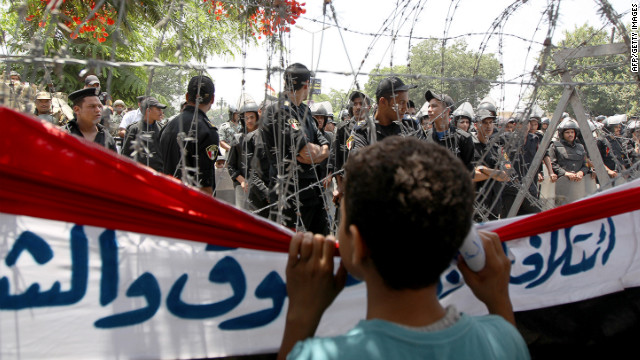 A boy peers through barbed wire at Egyptian military police standing guard outside the Constitutional Court in Cairo on Thursday.
A boy peers through barbed wire at Egyptian military police standing guard outside the Constitutional Court in Cairo on Thursday.
 Presidential candidate Mohamed Morsi of the Muslim Brotherhood, who is set for a runoff election against Ahmed Shafiq, speaks at a press conference in Cairo on Wednesday.
Presidential candidate Mohamed Morsi of the Muslim Brotherhood, who is set for a runoff election against Ahmed Shafiq, speaks at a press conference in Cairo on Wednesday.
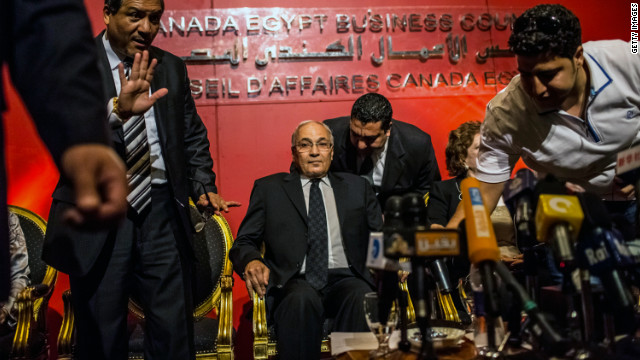 Former Prime Minister Ahmed Shafiq, center, is seated before addressing a business conference in Cairo on Wednesday.
Former Prime Minister Ahmed Shafiq, center, is seated before addressing a business conference in Cairo on Wednesday.
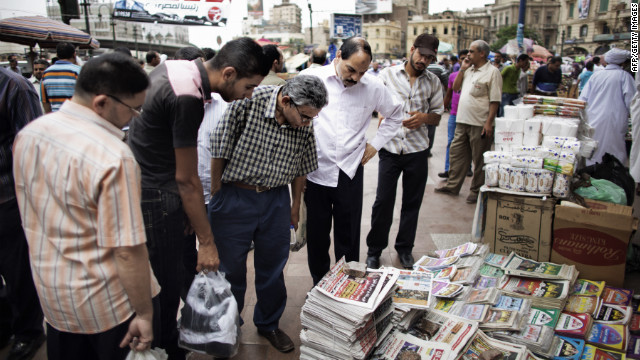 Egyptians read the front page of newspapers for sale outside of Al-Fatah Mosque in Cairo on Friday.
Egyptians read the front page of newspapers for sale outside of Al-Fatah Mosque in Cairo on Friday.
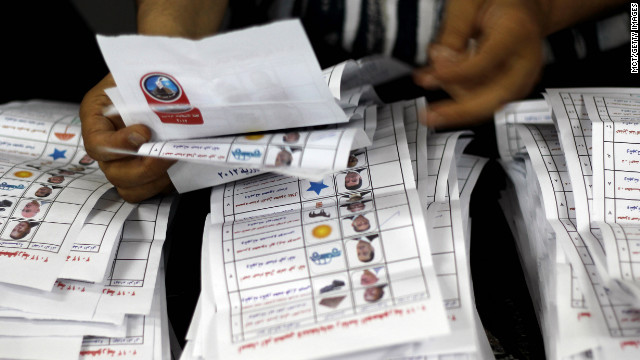 Ballots are counted by election officials in Alexandria as the country eagerly awaits the outcome.
Ballots are counted by election officials in Alexandria as the country eagerly awaits the outcome.
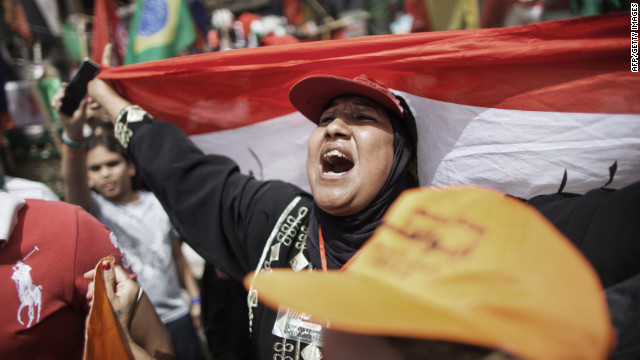 A supporter of presidential candidate Abdelmonen Abol Fotoh voices her opinions at Tahrir Square on Friday.
A supporter of presidential candidate Abdelmonen Abol Fotoh voices her opinions at Tahrir Square on Friday.
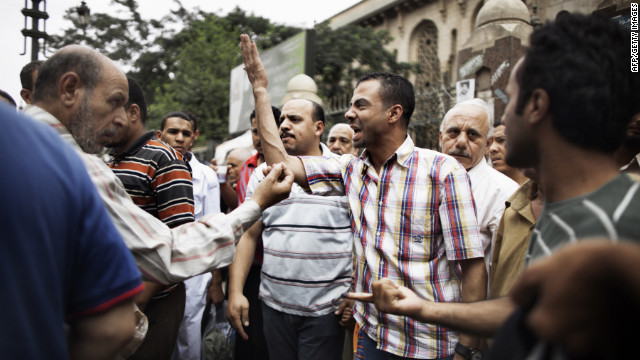 Supporters of various candidates debate outside Al-Fatah Mosque in Cairo.
Supporters of various candidates debate outside Al-Fatah Mosque in Cairo.
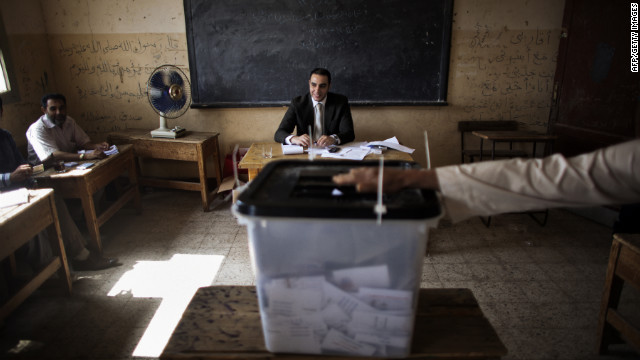 Electoral officials monitor voting in Namul, a village north of Cairo, on Thursday, the second and final day of voting in Egypt's historic presidential election. Egypt is holding its first presidential election since last year's toppling of Hosni Mubarak, part of the wave of Arab Spring uprisings.
Electoral officials monitor voting in Namul, a village north of Cairo, on Thursday, the second and final day of voting in Egypt's historic presidential election. Egypt is holding its first presidential election since last year's toppling of Hosni Mubarak, part of the wave of Arab Spring uprisings.
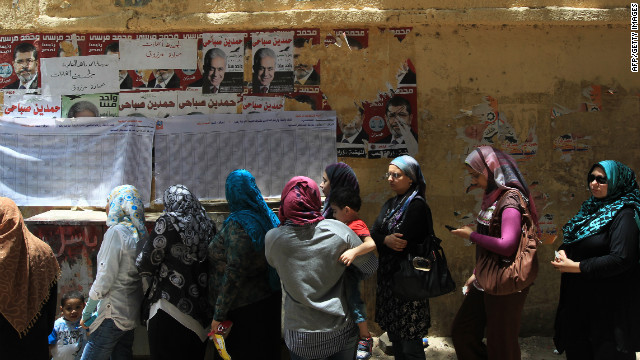 Egyptian women wait in line Thursday to cast their vote outside a polling station in Cairo. If no candidate gets a majority of the vote in the first round of voting, a second round will be held June 16-17.
Egyptian women wait in line Thursday to cast their vote outside a polling station in Cairo. If no candidate gets a majority of the vote in the first round of voting, a second round will be held June 16-17.
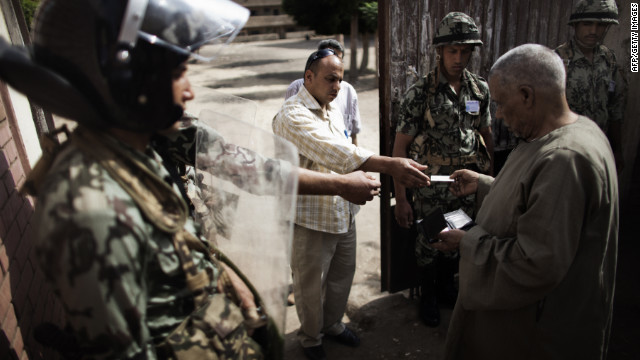 An election worker checks the identification of a voter at a polling place Thursday in Namul as Egyptian soldiers stand guard.
An election worker checks the identification of a voter at a polling place Thursday in Namul as Egyptian soldiers stand guard.
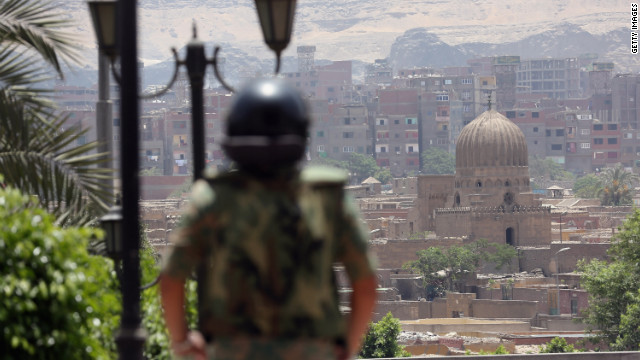 A soldier stands watch in the Egyptian capital on the second day of voting. A pervasive fear exists that the powerful military, which has run the country since Mubarak's fall 16 months ago, could try to hijack the election.
A soldier stands watch in the Egyptian capital on the second day of voting. A pervasive fear exists that the powerful military, which has run the country since Mubarak's fall 16 months ago, could try to hijack the election.
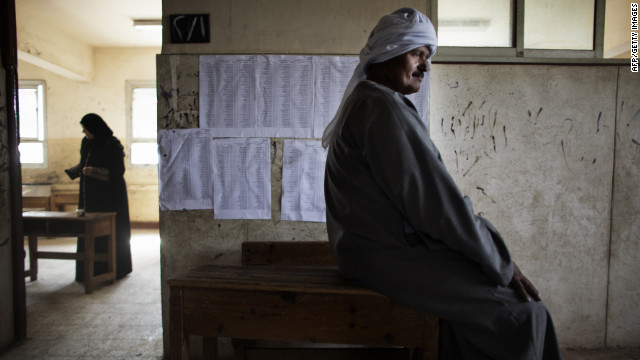 An Egyptian man waits to cast his ballot Thursday north of Cairo. The vote is considered Egypt's first free and fair presidential election in modern history.
An Egyptian man waits to cast his ballot Thursday north of Cairo. The vote is considered Egypt's first free and fair presidential election in modern history.
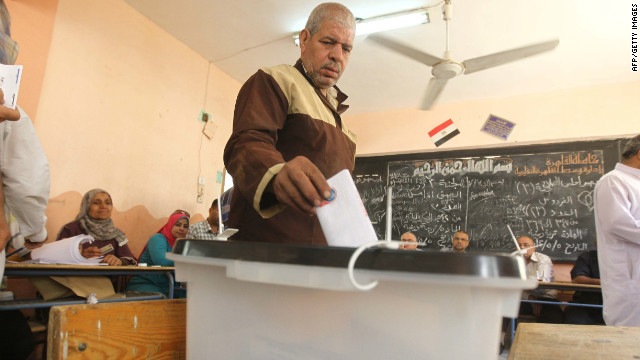 An Egyptian man drops off his ballot at a polling station Thursday in Cairo. The voting marks the first time Egypt has held a presidential election in which the results aren't known beforehand.
An Egyptian man drops off his ballot at a polling station Thursday in Cairo. The voting marks the first time Egypt has held a presidential election in which the results aren't known beforehand.
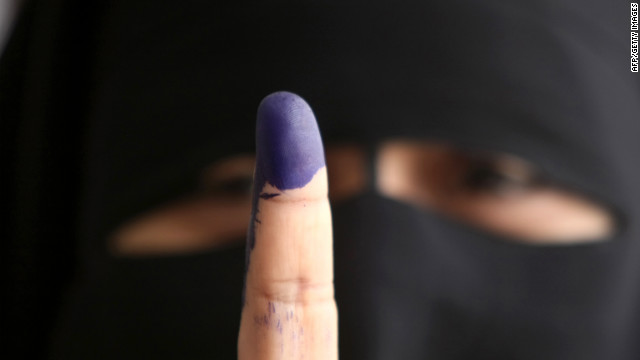 An Egyptian woman holds up an ink-stained finger after casting her ballot in Cairo on Wednesday, the first day of voting in the historic election.
An Egyptian woman holds up an ink-stained finger after casting her ballot in Cairo on Wednesday, the first day of voting in the historic election.
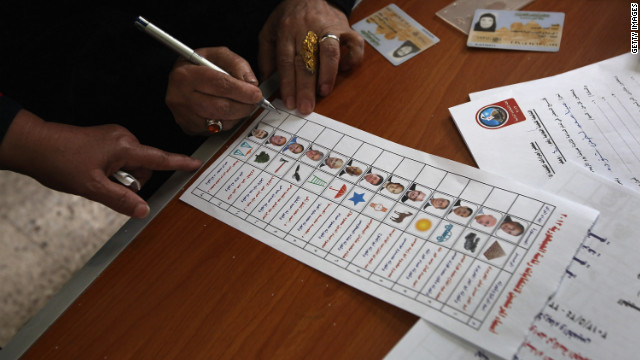 A voter studies her ballot Wednesday in Cairo. Thirteen candidates are competing in the wide-open race, but two withdrew after ballots were printed.
A voter studies her ballot Wednesday in Cairo. Thirteen candidates are competing in the wide-open race, but two withdrew after ballots were printed.
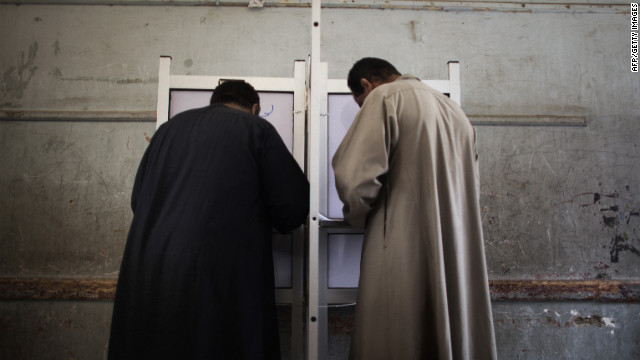 Egyptian men fill out their ballots Wednesday in Cairo. Results of the first round of voting are not expected before the weekend.
Egyptian men fill out their ballots Wednesday in Cairo. Results of the first round of voting are not expected before the weekend.
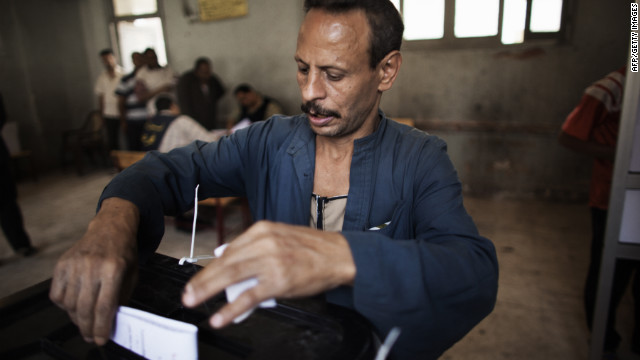 An Egyptian man casts his ballot at a Cairo polling station. Some Egyptians told CNN that they waited up to four hours Wednesday to vote.
An Egyptian man casts his ballot at a Cairo polling station. Some Egyptians told CNN that they waited up to four hours Wednesday to vote.
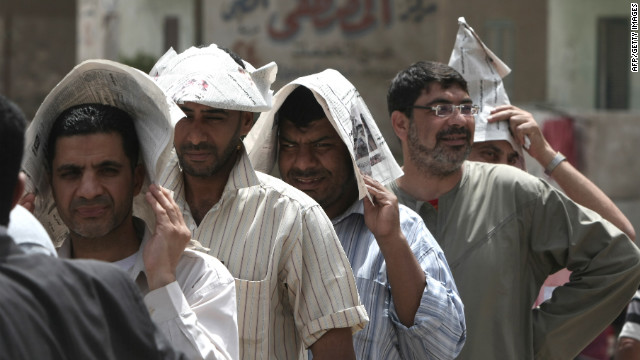 Egyptian men shield themselves from the hot sun outside a Cairo polling station Wednesday.
Egyptian men shield themselves from the hot sun outside a Cairo polling station Wednesday.
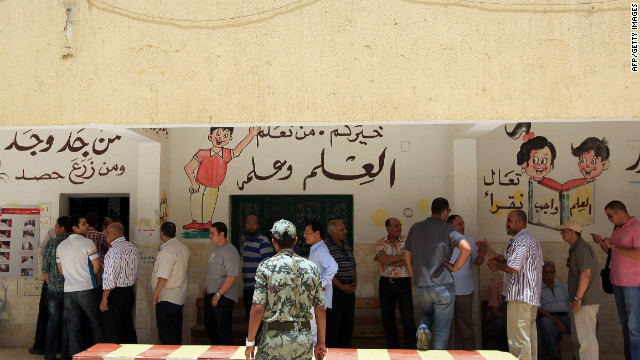 Egyptian men line up to cast their vote Wednesday in Cairo. Some 30,000 volunteers fanned out to ensure voting is fair, said organizers with the April 6 youth movement, which has campaigned for greater democracy in Egypt.
Egyptian men line up to cast their vote Wednesday in Cairo. Some 30,000 volunteers fanned out to ensure voting is fair, said organizers with the April 6 youth movement, which has campaigned for greater democracy in Egypt.
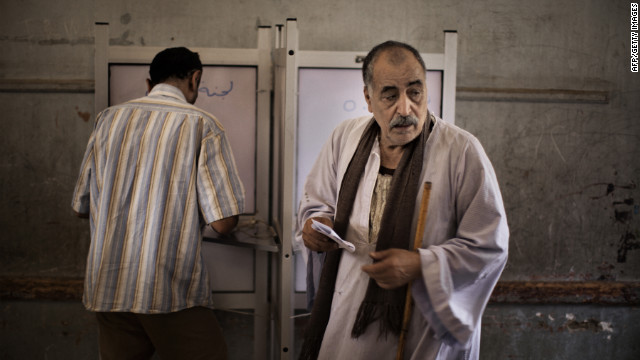 Egyptian men fill out their ballots at a Cairo polling place.
Egyptian men fill out their ballots at a Cairo polling place.
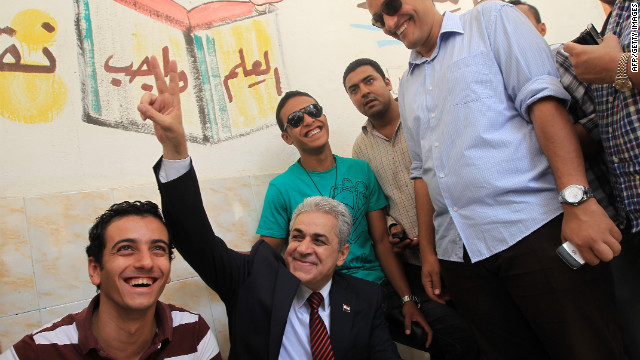 Presidential candidate Hamdeen Sabahy, a leftist dark-horse contender, flashes a sign of victory as he waits to vote at a Cairo school.
Presidential candidate Hamdeen Sabahy, a leftist dark-horse contender, flashes a sign of victory as he waits to vote at a Cairo school.
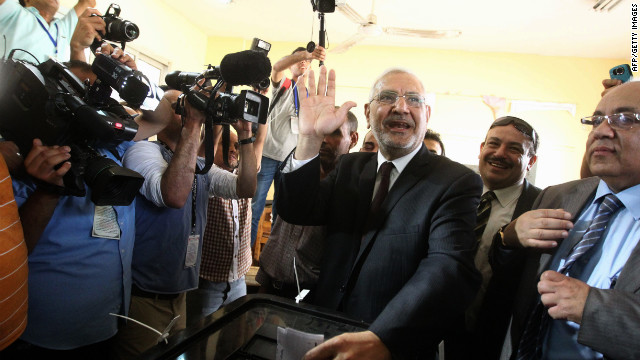 Presidential candidate Abdelmonen Abol Fotoh, a moderate Islamist, casts his ballot Wednesday in Cairo.
Presidential candidate Abdelmonen Abol Fotoh, a moderate Islamist, casts his ballot Wednesday in Cairo.
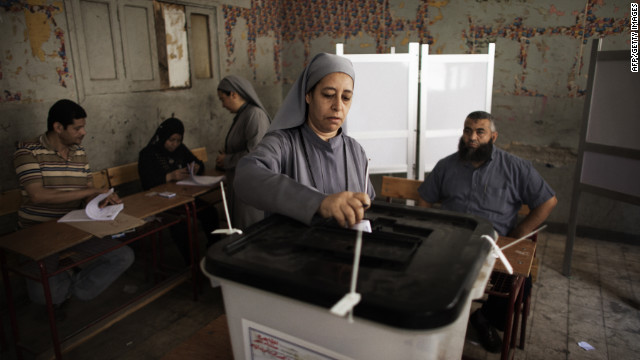 An Egyptian Coptic nun drops her ballot at a Cairo polling station Wednesday.
An Egyptian Coptic nun drops her ballot at a Cairo polling station Wednesday.
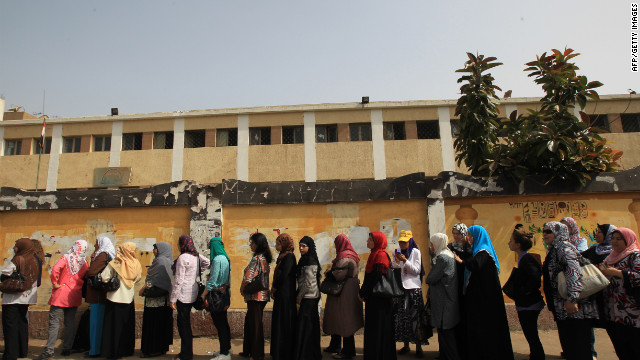 Egyptian women wait outside a polling station in Cairo. Many Egyptians seem uncertain of their loyalties to any particular cand
Egyptian women wait outside a polling station in Cairo. Many Egyptians seem uncertain of their loyalties to any particular cand























No comments:
Post a Comment